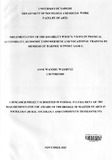| dc.contributor.author | Wambugu, Anne W | |
| dc.date.accessioned | 2013-02-24T13:05:39Z | |
| dc.date.issued | 2012 | |
| dc.identifier.uri | http://erepository.uonbi.ac.ke:8080/xmlui/handle/123456789/11008 | |
| dc.description.abstract | People with disability, have often been marginalized and faced difficulties as a result of
their disability. The government of Kenya recognizes that disability cuts across all sectors of development and should be an integral part of all national planning. The government has therefore continued to create a conducive environment for different players to enable them incorporate disability issues into policies and programmes. The purpose of this study was to establish the views of persons with disability on the implementation of the disability policy. The research objectives were to find out the accessibility of the physical environment, the availability of economic empowerment programs and availability of vocational training services to persons with disability.
The target population was the persons with physical disability, characterized by mobility
limitations. The respondents were drawn from Tujiinue support group in Kibera.
Snowballing sampling technique was used in selection of study respondents. Four key
informants were used to supplement the study findings. Two were from the ministry of
Gender and Sports, Culture and Social Services while two were from the national council of persons with disability. The data collection methods that were used were schedulestructured interviews, afocus group discussion and case studies.The study findings showed that most of the respondents felt that accessibility of the
physical environment to persons with disability continued being a challenge with a
majority of the respondents (92%) saying that they experienced problems while trying to
access buildings that had not complied with the adjustment order cited in the disability
act. The study revealed that persons with disability were yet to be economically
empowered. The 5% job reservation stipulated in the disability act for persons with
disability was yet to be achieved. The financing institutions also were yet to begin
advancing loans to persons with disability as capital to create self employment hence lead to self reliance. The study also showed that a high proportion (90%) of the respondents indicated that they had not gone through any form of vocational training to help them gain skills in starting own business or securing employment. The findings indicated that there was need for increased access to technical, vocational, entrepreneurial and professional training opportunities for persons with disability as stipulated in the disability act. The study concluded that despite the Disability Act having been enacted in 2004, persons with disability felt that the implementation of the policy needed to be fasttracked especially concerning the physical accessibility, economic empowerment and provision of vocational training for the persons with disability. | en |
| dc.description.sponsorship | The University of Nairobi | en |
| dc.language.iso | en | en |
| dc.publisher | The University of Nairobi | en |
| dc.title | Implementation of the disability policy: views on physical accessibility, economic empowerment and vocational training by members of Tujiinue support group. | en |
| dc.type | Thesis | en |
| local.embargo.terms | 6 months | en |
| local.publisher | Department of sociology and social work | en |

